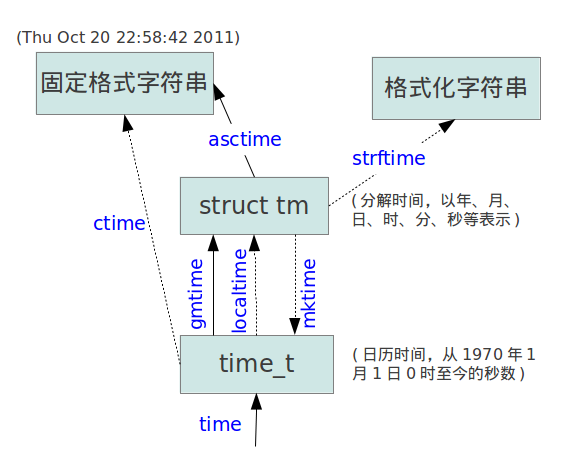time.h是C/C++中的日期和時間頭檔案。用於需要時間方面的函式。
基本介紹
- 中文名:c語言時間頭檔案
- 外文名:time.h
- 類別:頭檔案
- 作用:從系統時鐘獲取時間方式
- 函式名稱:localtime
代碼示例
#include<stdio.h>#include<time.h>int main(){ time_t timer = time(NULL); printf("ctime is %s\n", ctime(&timer));//得到日曆時間 return 0;}獲取時間方式
time函式
struct tm {
int tm_sec; /* 秒 – 取值區間為[0,59] */
int tm_min; /* 分 - 取值區間為[0,59] */
int tm_hour; /* 時 - 取值區間為[0,23] */
int tm_mday; /* 一個月中的日期 - 取值區間為[1,31] */
int tm_mon; /* 月份(從一月開始,0代表一月) - 取值區間為[0,11] */
int tm_year; /* 年份,其值等於實際年份減去1900 */
int tm_wday; /* 星期 – 取值區間為[0,6],其中0代表星期天,1代表星期一,以此類推 */
int tm_yday; /* 從每年的1月1日開始的天數 – 取值區間為[0,365],其中0代表1月1日,1代表1月2日,以此類推 */
int tm_isdst; /* 夏令時標識符,實行夏令時的時候,tm_isdst為正。不實行夏令時的進候,tm_isdst為0;不了解情況時,tm_isdst()為負。*/
};
#define _TM_DEFINED
#endif
#include<time.h>#include<stdio.h>#include<dos.h>int main(){ time_t timer; struct tm *tblock; timer = time(NULL); tblock = localtime(&timer); printf("Local time is: %s", asctime(tblock)); return 0;}#include<stdio.h>#include<time.h>int main(){ time_t t; time(&t); printf("Today's date and time: %s", ctime(&t)); return 0;}#include<time.h>#include<stdio.h>#include<windows.h>int main(){ time_t start, end; system("cls");//清屏 time(&start); Sleep(5000);//等待5秒,Sleep()函式包含在windows.h的頭檔案里,以毫秒為單位 time(&end); printf("The difference is: %f seconds", difftime(end, start)); return 0;}#include<stdio.h>#include<stdlib.h>#include<time.h>#include<dos.h>char*tzstr="TZ=PST8PDT";int main(){ time_t t; struct tm *gmt,*area; putenv(tzstr); tzset(); t = time(NULL); area = localtime(&t); printf("Local time is: %s", asctime(area)); gmt = gmtime(&t); printf("GMT is: %s", asctime(gmt)); return 0;}#include<time.h>#include<stdio.h>#include<dos.h>int main(){ time_t t; t = time(NULL);//默認1970-1-1 printf("The number of seconds since January1, 1970 is %ld", t); return 0;}#include<time.h>#include<stdlib.h>#include<stdio.h>int main(){ time_t td; putenv("TZ=PST8PDT"); tzset(); time(&td); printf("Current time = %s", asctime(localtime(&td))); return 0;}
